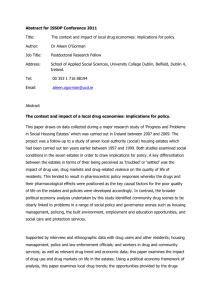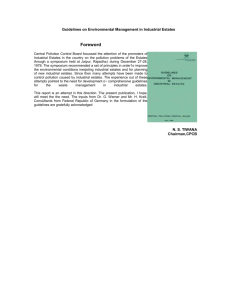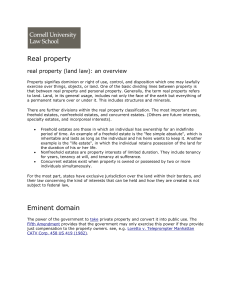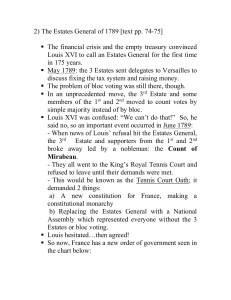to view our policy on ethical investment (doc format)
advertisement
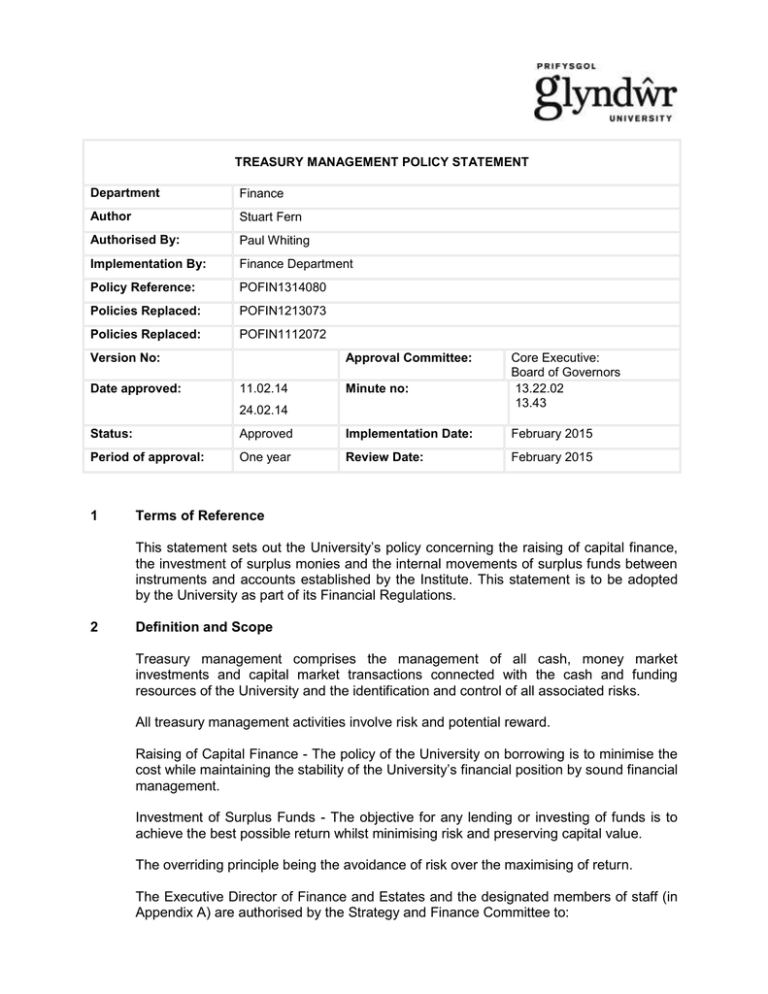
TREASURY MANAGEMENT POLICY STATEMENT Department Finance Author Stuart Fern Authorised By: Paul Whiting Implementation By: Finance Department Policy Reference: POFIN1314080 Policies Replaced: POFIN1213073 Policies Replaced: POFIN1112072 Version No: Date approved: Approval Committee: 11.02.14 Minute no: 24.02.14 Core Executive: Board of Governors 13.22.02 13.43 Status: Approved Implementation Date: February 2015 Period of approval: One year Review Date: February 2015 1 Terms of Reference This statement sets out the University’s policy concerning the raising of capital finance, the investment of surplus monies and the internal movements of surplus funds between instruments and accounts established by the Institute. This statement is to be adopted by the University as part of its Financial Regulations. 2 Definition and Scope Treasury management comprises the management of all cash, money market investments and capital market transactions connected with the cash and funding resources of the University and the identification and control of all associated risks. All treasury management activities involve risk and potential reward. Raising of Capital Finance - The policy of the University on borrowing is to minimise the cost while maintaining the stability of the University’s financial position by sound financial management. Investment of Surplus Funds - The objective for any lending or investing of funds is to achieve the best possible return whilst minimising risk and preserving capital value. The overriding principle being the avoidance of risk over the maximising of return. The Executive Director of Finance and Estates and the designated members of staff (in Appendix A) are authorised by the Strategy and Finance Committee to: 3 a) arrange the investment of surplus funds of the University, to a maximum of £1,000,000, with any one of the organisations listed in a schedule approved by Strategy and Finance Committee (Appendix B). b) borrow funds subject to strategic approval by the Strategy and Finance Committee and Board of Governors. Formulation of Treasury Management Strategy The University’s Treasury Management requirements are determined in the annual financial budget prepared by the Executive Director of Finance and Estates and approved by the Strategy and Finance Committee and Board of Governors of the University. The Executive Director of Finance and Estates will prepare annually for the approval of the Strategy and Finance Committee and Board of Governors of the University: a) A forecast of surplus monies and loan repayment requirements (if any) for the forthcoming financial year; and b) A strategy for funding the University’s capital finance proposals (if any) and investing surplus cash for the period covered by the forecast. In preparing the strategy the Executive Director of Finance and Estates will have regard to: c) the maintenance of a stable financial position for the University; d) the current level of interest rates and forecasts of future changes in interest rates; e) policies contained in other planning documents, e.g. the Strategic plan, the estates strategy, the revenue budget and the capital programme; f) the aggregate of all funds, loans and accounts operated by the University Based on the annual forecast the Executive Director of Finance and Estates will prepare bi-annual rolling forecasts for the current year of the short term surplus cash for the purpose of applying the strategy on a day to day basis. When applicable the Executive Director of Finance and Estates will recommend amendments to the strategy to the Strategy and and Finance Committee and Board of Governors. The Executive Director of Finance and Estates has the delegated authority to manage the University’s strategy for depositing surplus funds and cash flow of the University. In exercising these powers he/she will have regard to: g) the credit risk associated with the approved organisations with which the funds may be deposited or invested; h) 4 the effect of possible changes in interest rates on the cost of borrowing and the return from investing and the needs to maintain adequate liquid funds to meet the University’s obligations. Approved Methods of Raising Capital Finance The Executive Director of Finance and Estates, in conjunction with the Strategy and Finance Committee and the Board of Governors, will undertake on its behalf the borrowing activities of the University. The Executive Director of Finance and Estates cannot commit the University to any borrowing without obtaining the specific authority of the Strategy and Finance Committee and the Board of Governors. The Executive Director of Finance and Estates will prepare for the Strategy and Finance Committee a report for any proposed capital borrowing. In raising capital finance, the Executive Director of Finance and Estates will take account of: a) b) c) d) 5 the University’s powers and rules; statutory restriction the requirements of the financial memorandum with all relevant funding bodies terms and covenants of borrowing Investing and Depositing of Surplus Funds The overriding principle guiding the investing of surplus cash balances is the preservation of the capital value of the University’s resources. The Executive Director of Finance and Estates has delegated authority to invest surplus funds of the University in accordance with the annual financial strategy and in accordance with the terms of this statement. The Executive Director of Finance and Estates is authorised to invest ONLY in Treasury Deposit Accounts, interest bearing current accounts and similar instruments which preserve the Capital Value of the investment and minimise risk. The Executive Director of Finance and Estates is responsible for ensuring the monitoring of the credit-worthiness of deposit takers using appropriate external sources of information. The principle factor governing the exposure of surplus funds to interest rate movements is the University’s cash flow forecast. Where surplus funds are required to meet possible cash outflows in the near future they will necessarily be deposited short term for periods which will ensure that funds are available. The University requires its officers to pay appropriate regard to relevant corporate governance, social, ethical and environmental considerations in the selection, retention, and realisation of all treasury investments. The Strategy and Finance Committee expects this to be done in a manner which is consistent with the University’s investment objectives and legal duties. The University is also to seek adequate assurance from its depositors that they satisfy these ethical requirements. 6 Legal Issues Prior to entering into any borrowing or investment transaction it is the responsibility of the Executive Director of Finance and Estates to satisfy himself by reference if necessary to the University’s legal advisers that the proposed transaction does not breach any statute, the University’s financial regulations, or the requirements of the financial memorandum with Higher Education Funding Council for Wales. 7 Use of External Managers The University may appoint external managers of its short term deposits. Their terms of engagement are subject to approval by the Strategy and Finance Committee and will be subject to annual review. 8 Delegation The University has drawn up and approved a scheme of delegation for the operation of treasury policy, a summary of which is set out in Appendix C. 9 Review and Reporting The Executive Director of Finance and Estates will provide the Strategy and Finance Committee with a regular report on cash flow and investment and an annual report on performance. Appendix A – Designated Members of Staff Executive Director of Finance and Estates - Paul Whiting Head of Finance - Stuart Fern Finance Services Manager - Sarah Bridger Management Accountants - Michelle Matthews, Dominic Rayner Appendix B – Approved Organisations for Investment NatWest plc Royal Bank of Scotland plc Lloyds TSB/Halifax Bank of Scotland plc Barclays Bank plc HSBC plc Santander UK plc Svenska Handelsbanken AB Appendix C – Scheme of Delegation for Treasury Policy Delegated Power: Approval and amendment of Treasury Management Policy Amendment of list of approved organisation and limits Approval of Annual Financial Strategy Approval of Treasury Systems Document Application of approved strategy Treasury Dealing with counterparties Authorisation of cash transfers Borrowing and lending documentation Banking and Dealing Mandates Exercised by: Strategy and Finance Committee and Board of Governors Strategy and Finance Committee and Board of Governors Strategy and Finance Committee and Board of Governors Strategy and Finance Committee and Board of Governors Executive Director of Finance and Estates Executive Director of Finance and Estates/Head of Finance Executive Director of Finance and Estates/Head of Finance Executive Director of Finance and Estates, Strategy and Finance Committee and Board of Governors Executive Director of Finance and Estates under the authority of Strategy and Finance Committee and Board of Governors ETHICAL INVESTMENT POLICY Department Finance Department Author Director of Finance and Estates Authorised By: Director of Finance and Estates Implementation By: Finance Department Policy Reference: POFIN1314080 Policy Replaced: POFIN1213073 Version No: Version 1 Approval Committee: Date approved: 11.02.14 Minute no: 13.22.02 13.43 Implementation February 2015 24.02.14 Status: Approved Core Executive: Board of Governors Date: Period of approval: 12 Months Review Date: February 2015 The following extracts are taken from the Treasury Management Policy Statement of the University in relation to ethical investment: Terms of Reference This statement sets out the University’s policy concerning the raising of capital finance, the investment of surplus monies and the internal movements of surplus funds between instruments and accounts established by the Institute. This statement is to be adopted by the University as part of its Financial Regulations. Definition and Scope Investment of Surplus Funds - The objective for any lending or investing of funds is to achieve the best possible return whilst minimizing risk and preserving capital value. The overriding principle being the avoidance of risk over the maximizing of return. Investing and Depositing of Surplus Funds The University requires its officers to pay appropriate regard to relevant corporate governance, social, ethical and environmental considerations in the selection, retention, and realization of all treasury investments. The Strategy and Finance Committee expects this to be done in a manner which is consistent with the University’s investment objectives and legal duties. The University also seeks adequate assurance from its depositors that they satisfy these ethical requirements.
